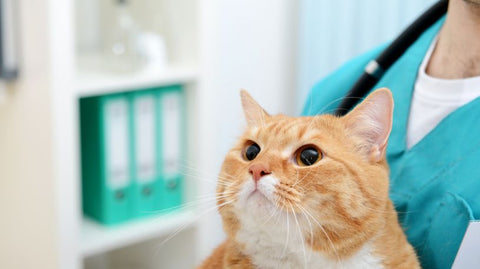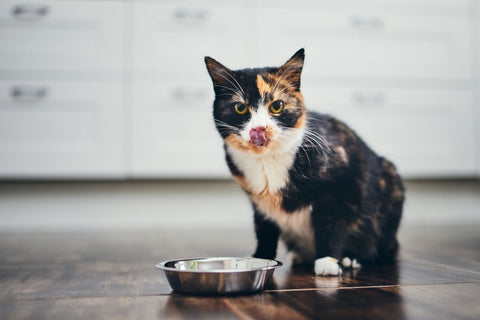

Symptoms | Treatment | Recommended Supplements
What Is a Cat UTI?
Urinary Tract Infection in cats is characterized by frequent urination, problems trying to urinate, bladder discomfort, and sometimes blood in the urine. Commonly they will not urinate in their litter box. When suffering from urinary tract infection the feline seems to prefer smooth surfaces like the floor or any other smooth surface such as a bathtub, or shower enclosure.
Symptoms & Signs Your Cat Has a UTI
It's important to note that these signs can also be indicative of other urinary tract conditions, so consulting a veterinarian for proper diagnosis is essential. Here are some common signs that your cat may have a UTI:
Frequent Urination
If you notice that your cat is urinating more frequently than usual or making more attempts to use the litter box, it could be a sign of a UTI. They may only produce small amounts of urine each time.
Straining to Urinate
Cats with UTIs often experience discomfort or pain while urinating, leading to straining or prolonged squatting in the litter box. They may vocalize or show signs of distress during urination.
Urinating Outside the Litter Box
Cats with UTIs may associate pain or discomfort with their litter box and start urinating outside of it. This behavior can be an attempt to find relief or an indication that they are associating the litter box with their discomfort.
Blood in Urine
Bloody or discolored urine is a significant indication of a potential UTI. If you notice pink, red, or brownish urine, it's essential to consult your veterinarian promptly.
Licking Genital Area Excessively
Cats with UTIs may exhibit excessive grooming of their genital area. This behavior is an instinctual response to alleviate discomfort or clean themselves after urinating.
Strong Odor
A strong, unpleasant odor emanating from your cat's urine can be an indication of a UTI. The infection may cause changes in the urine's smell, making it more pungent than usual.
Behavioral Changes
Cats with UTIs may display general signs of discomfort, such as irritability, restlessness, or lethargy. They may also avoid being touched or cry out when their abdomen is touched.
articleproducts1
Other Urinary Disorders in Cats
Cat's often develop infections in their lower urinary system. If you have a cat, you will have to deal with UTI's. Additionally, it is not just urinary tract infections that can cause issues, other issues that can affect your cat include incontinence, bladder stones, and cancer. Some bladder issues may share the same symptoms as urinary tract infections. It's important to consult with a vet if your cat’s UTI does not go away.
How to Treat a UTI in Cats at Home
A urinary tract infection is common for cats to develop at any given time. They are actively found in male cats due to their narrow urethra that gets blocked easily by tiny bladder stones, mucus, and crystals.
1. Increase Water Intake
Water Consumption - makes sure your pet properly hydrates and drinks plenty of water. Water is very important for your cat or any pet when you are dealing with a UTI.
2. Change Your Cat's Diet
Change to a high protein diet and stay away from dry cat food. This should help alleviate your cat's urinary tract infection.
3. Try Diluted Cranberry Juice
Cranberry juice is useful in acidifying the urine and gives your cat less of a chance to develop a blockage or infection. It is however too strong for a cat to consume by itself. Instead, use unsweetened cranberry juice with water to dilute it before pouring it over their food.
4. Apple Cider Vinegar
Apple cider vinegar is a remedy for urinary tract infections in cats that can kill the weak microbes. Just mix a few teaspoons of apple cider vinegar with one-quarter water and give it to your pet with a needless syringe directly into the mouth.
During your cat's urinary tract infection you can comfort them by using many different herbs to relieve them of any discomfort.
Natural Supplements to Help Treat UTI's in Cats
Determining the underlying cause of a Cat UTI is the perhaps the most important however, there are a few very important factors when it comes to helping your cat's urinary tract and bladder.
articlebanners3
Conclusion
Urinary tract infections (UTIs) are a frequent concern among our feline companions, but rest assured, there is often an underlying cause that can be resolved. To address and prevent UTIs in cats, it is vital to ensure they are following a diet that suits their specific species and to assess their environment for any potential stressors that could contribute to the problem.
Fortunately, there are a plethora of effective at-home treatments available to alleviate the discomfort associated with UTIs and help your beloved cat feel better.
However, it is crucial to keep in mind that if your cat experiences difficulty urinating, displays signs of pain, or exhibits blood in their urine, it is imperative to seek immediate veterinary attention. In severe cases, consulting a veterinarian is the best course of action. Nevertheless, if detected early enough, these remedies and natural cat supplements can play a significant role in healing and treating UTIs, ensuring your cat's well-being is restored.
About Prana Pets
At Prana Pets, we help pets and the people who love them, live their best lives through our holistic approach to health and wellness. Our proprietary blends are formulated specifically for dogs and cats, using the highest quality, human-grade ingredients and are all third party lab tested for safety and efficacy. In other words, you can trust that our products are safe for your beloved pets.
Prana Pets Cat Urinary Tract Support
Prana Pets’ Cat Urinary Tract Support is a homeopathic formula that maintains the health and overall function of your kitty’s urinary tract. This formula can be used as a daily bladder support or in times of urinary tract distress.
articlebanners2




